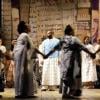
It felt like a shadow was falling across an era as the Kronos Quartet performed Michael Abels’s At War With Ourselves — 400 Years of You on Saturday, Feb. 15, at The Wallis in Beverly Hills.
Abels’s composition was inspired by Nikky Finney’s 2013 poem “The Battle of and for the Black Face Boy,” and Finney was on hand to recite the text, accompanied by Kronos and the choral ensemble Tonality.
Finney has long made it her literary mission to keep the lights of social justice blazing. Over a career spanning 40 years, she has authored six books and composed many poems and essays that explore the complexities of Black identity and life in the American South.
In February 2025, as the walls of rational government seem to be crumbling, the poem and performance at The Wallis brought to mind Winston Churchill’s speech on the eve of World War II in which he forecast that “the stations of uncensored expression are closing down; the lights are going out.”

Finney, a 2011 National Book Award winner, has said of her poetry:
“I know the sound of the ’60s and ’70s. There was a lot of standing with signs, there was a lot of shouting. I wanted to be a poet who didn’t shout, who said things but said them with the most beautiful attention to language. … I’ve been really working on this for [my entire career], exploring how those two paths intersect, the path where the beautifully said thing meets the really difficult-to-say thing.”
That is certainly the guiding principle behind her collaboration with Abels, who has shaped his music beautifully to her words. There is a clear through line that links his contributions to the award-winning opera Omar (on which he collaborated with Rhiannon Giddens) and his musical settings for the 16 sections of At War With Ourselves. Both compositions premiered around the same, and both rely on a diverse musical vocabulary. Abels’s work here contrasts richly textured music for string quartet with several movements of swinging jazz. And when Finney’s text boils over into anger and action, Abels’s score ignites in confrontational rhetoric.
But Abels is not a radical. His music is dynamic and immensely listenable, only selectively abrasive. At War With Ourselves shows him to be a master craftsman of vocal music. The writing for chorus is both straightforward and complex in its harmonic structure, revealing a flair for fugal layering and an ability to balance solo voices against the ensemble.
Tonality, led by Founding Artistic Director Alexander Lloyd Blake, is a perfect fit for the piece, given that Blake started the choir with an explicit mission to support diversity and social awareness. The singers were expert in accompanying Finney, finding rainbow coloration and delicate shading in her language and Abels’s music.

Over more than five decades, Kronos has consistently been in the vanguard of musical life. Today, its white-haired patriarch and founder, violinist David Harrington, is the only remaining longtime member, now partnered with a trio of fine younger musicians: violinist Gabriela Díaz, violist Ayane Kozasa, and cellist Paul Wiancko. What hasn’t changed is the illuminating, dedicated kind of performance that Kronos gives.
Finney’s poetry references American slavery, a people’s reduction to the status of a commercial commodity, brought glaringly up to date with a climactic outburst from the chorus that begins as a recitation of the names of Black men killed by police officers and devolves into a screaming cacophony.
But are enough people listening?




